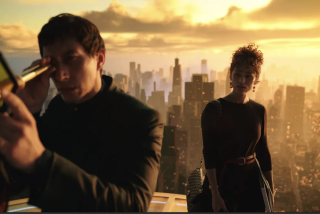Disney expects $200-million loss on ‘John Carter’
Walt Disney Co. said it expected to incur a $200-million loss on its big-budget Martian adventure film “John Carter,” ranking it among the biggest box-office busts of all time.
The film, which cost an estimated $350 million to make and market, brought in just $184 million in global box-office sales in its first two weekends. That’s well shy of expectations, and likely to drag the movie studio to a second-quarter operating loss that Disney estimated at $80 million to $120 million.
“Unfortunately for ‘John Carter,’ the story became all about this massive budget,” said Paul Dergarabedian, president of the box-office division of Hollywood.com. “The movie will take one of the biggest losses in recent memory.”
Wall Street analysts had anticipated a write-down for the film, based on uneven reviews and pre-release surveys of prospective moviegoers. Even before the movie opened, investment firms had estimated losses at $100 million to $165 million.
The tide of red ink places “John Carter” alongside such cinematic washouts as the 2006 computer animated film “Flushed Away,” produced by Aardman Animations in partnership with DreamWorks Animation, which resulted in a $109-million write-down (and the U.S. studio ending its deal with the British film company), and the 2004 historical drama “The Alamo,” also from Disney, which resulted in a $75-million write-off.
The red planet has been hostile financial terrain for Walt Disney Studios. Last year’s computer animated 3-D film “Mars Needs Moms” also had a big budget but brought in only $6.9 million in its opening weekend and ended with a $100-million write-down.
Harold Vogel, president of Vogel Capital Management and the author of “Entertainment Industry Economics: A Guide for Financial Analysis,” said that although the $200-million figure is a “big, box-car-sized loss,” it nonetheless needs to be viewed in context of the studio’s parent company, with its nearly $80 billion market capitalization.
“This is a little unpleasant episode or scratch,” Vogel said. “Disney is so much larger than all of this, they can easily absorb the loss and go on and have many, many good years in the future. It’s the equivalent of a ding on the side of your car. You wish it didn’t happen. But at the end of the day, the car drives fine.”
The Martian adventure story was based on a century-old science fiction series from Tarzan creator Edgar Rice Burroughs that had inspired other filmmakers, including George Lucas and James Cameron. It was intended as a potential new Disney franchise, which would fuel merchandise sales and theme park attractions, and lead to film sequels.
But the movie failed to connect with contemporary audiences in the U.S., in part because the source material had already been picked over by so many admirers that the film felt derivative. Further complicating its chances for success, the film’s director, Andrew Stanton, had never made a live-action movie. The studio production and marketing executives guiding the project had limited experience in running movie divisions.
Disney issued a brief statement Monday warning of the expected operating loss but promoting its summer movies, including Marvel’s latest superhero adventure, “The Avengers,” and Pixar Animation Studios’ original film “Brave.”
“We believe [these] have tremendous potential to drive value for the studio and the rest of the company,” the company said in its statement.
More to Read
The biggest entertainment stories
Get our big stories about Hollywood, film, television, music, arts, culture and more right in your inbox as soon as they publish.
You may occasionally receive promotional content from the Los Angeles Times.










